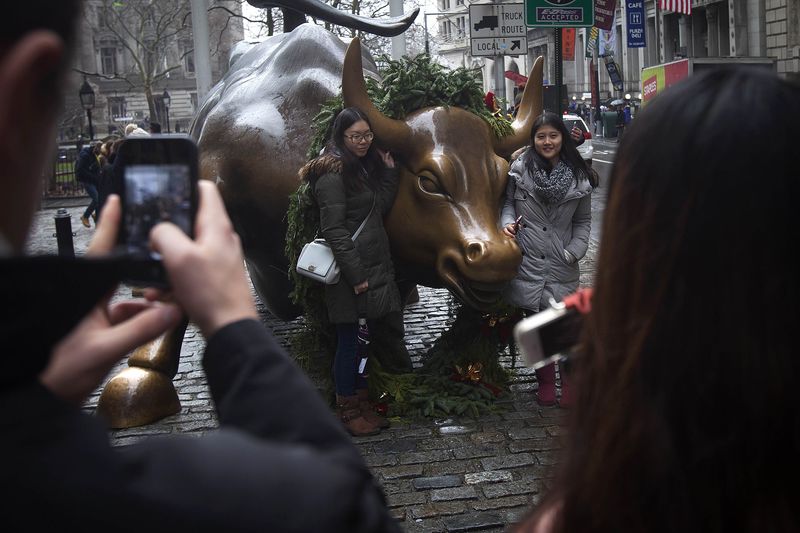By Ryan Vlastelica
NEW YORK (Reuters) - U.S. stocks rose on Tuesday, with the Dow closing above 18,000 for the first time ever and the S&P 500 ending at a record after an unexpectedly strong report on economic growth.
The Nasdaq ended modestly lower, pressured by the biggest selloff in biotech names in many months, while trading was light ahead of the Christmas holiday. Markets will close early on Wednesday and will be closed all of Thursday.
Both the Dow and S&P 500 hit intraday records in their fifth-straight day of gains. The Dow rose as high as 18,069.22 and is up about 175 percent from a 12-year closing low hit on March 9, 2009. The S&P's record close was its 51st such record this year.
The final estimate for third-quarter U.S. economic growth was revised up to a 5 percent annual pace, its quickest in 11 years and easily topping expectations for growth of 4.3 percent.
"Everyone is surprised, and I'm definitely pleased," said Wayne Kaufman, chief market analyst at Phoenix Financial Services in New York. "But the question is, how can inflation be so low when GDP is so high? Either this is just a one-off and GDP will fall back dramatically, or we'll see a pickup in inflation, which could put more pressure on the Fed."
The report spurred a broad rally, with nine of the ten primary S&P 500 sectors higher on the day. The only group to fall was healthcare <.SPXHC>, down 2.2 percent alongside a massive drop in biotech stocks.
The Nasdaq biotech index (NBI) fell 4.6 percent, its biggest one-day decline since April 10. Components of the index made up the top six percentage decliners on the S&P; Celgene Corp (O:CELG) fell 6.5 percent to $106.12 while Biogen (O:BIIB) lost 4.7 percent to $335.76. Regeneron Pharmaceuticals (O:REGN) fell 4.6 percent to $394.05.
Gilead Pharmaceuticals (O:GILD) fell 3.7 percent to $89.45, extending Monday's drop of 14 percent, which came after Express Scripts (O:ESRX) said it would abandon covering Gilead's hepatitis C treatment in favor of a cheaper option.
"This is just a knee-jerk reaction, based on a bear thesis that Express Scripts will start to dictate prices," said Kaufman. "I don't see how this is any different than any other company in another sector getting more competition. Soon people will go through the stocks one-by-one to see which got oversold."
The Dow Jones industrial average (DJI) rose 64.67 points, or 0.36 percent, to 18,024.11, the S&P 500 (SPX) gained 3.64 points, or 0.18 percent, to 2,082.18 and the Nasdaq Composite (IXIC) dropped 16.00 points, or 0.33 percent, to 4,765.42.
Advancing issues outnumbered declining ones on the NYSE by 1,990 to 1,090, for a 1.83-to-1 ratio on the upside; on the Nasdaq, 1,399 issues rose and 1,353 fell for a 1.03-to-1 ratio favoring advancers.
The benchmark S&P 500 index was posting 124 new 52-week highs and 5 new lows; the Nasdaq Composite was recording 182 new highs and 53 new lows.

About 5.41 billion shares traded on all U.S. platforms, according to BATS exchange data, compared with the month-to-date average of 7.78 billion.
(Editing by Meredith Mazzilli)